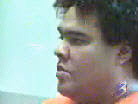 |
| Brian Williams in court |
General Resources / Legal Resources / Medical
Resources / Briefing Papers / State Activity
Hospital Closures / Preventable
Tragedies / Press Room / Search
Our Site / Home
Biography: Brian Williams
Brian Williams was found not guilty by reason of insanity in June 2001 and was taken to the Center for Forensic Psychiatry in Ypsilanti, Michigan. He had been charged with first-degree murder in the death of Kevin Heisinger.
Williams was diagnosed with paranoid schizophrenia in his late teens. He was 40 at the time of the murder.
 |
| Brian Williams in court |
From a Detroit Free Press article: "Brian Williams lived in a cycle: get treatment, do well, stop taking medicine, get sick again. When off his medicine, Williams would disappear or stay in homeless shelters. He'd resurface months later in faraway places including Washington state or Baltimore, Md. That changed in the early 1990s. With help from his brother, a Detroit attorney and retired police lieutenant, he settled in Detroit. By 1995, Williams moved to Ypsilanti, near Eastern Michigan University, and became a client of the Washtenaw County Community Mental Health Organization. Williams took classes at EMU, mainly in computer studies."
From a Detroit News article: "Williams' brother, Detroit attorney Amos Williams, said ... that his brother Brian is mentally ill. He is intelligent, brother to three engineers, two of whom graduated from the University of Michigan, and a retired lieutenant colonel in the Army. Amos Williams says his brother's intelligence makes his mental illness harder. "It would be better, he would have less psychic pain, if he were less intelligent. But he knows he's trapped. ... Once, he sat down and cried. He said, 'look at you guys, and look at me,' " Amos Williams said."
press room | press kit on Kevin's Law
general
resources | legal resources | medical
resources | briefing papers | state activity
hospital closures | preventable
tragedies | press room | search
| home
| The contents of TAC's website are copyrighted by the Treatment Advocacy Center unless otherwise indicated. All rights reserved and content may be reproduced, downloaded, disseminated, or transferred, for single use, or by nonprofit organizations for educational purposes only, if correct attribution is made. TAC is an I.R.C. � 501(c)(3) tax-exempt corporation. Donations are appreciated and are eligible for the charitable contribution deduction under the provisions of I.R.C. � 170. Please note that TAC does not accept funding from pharmaceutical companies or entities involved in the sale, marketing, or distribution of such products.
Treatment Advocacy Center (TAC), 200 N. Glebe Road, Suite 730, Arlington, VA 22203 703 294 6001/6002 (phone) | 703 294 6010 (fax) | www.treatmentadvocacycenter.org (website) [email protected] (general email) | [email protected] (press contact) [email protected] (webmaster) |